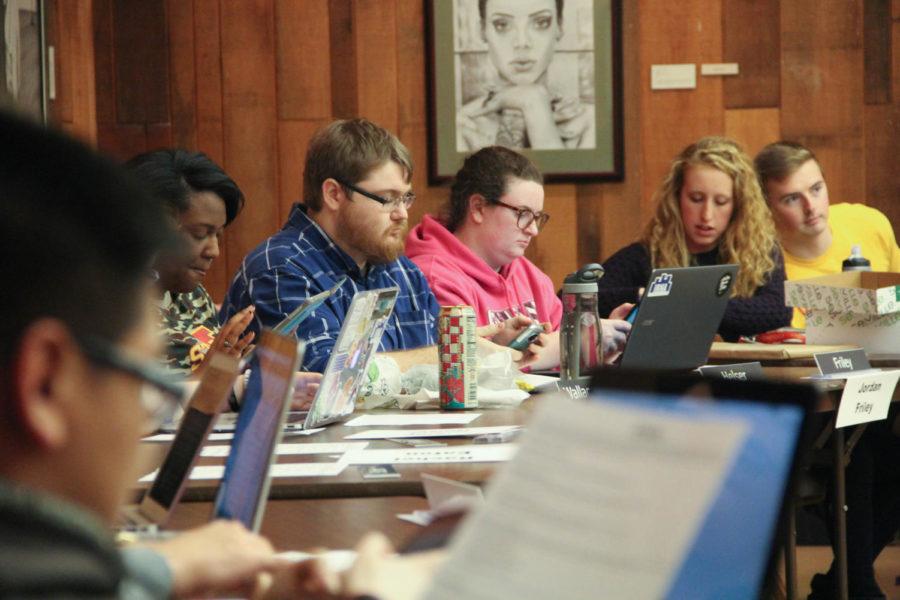- App Content
- App Content / News
- News
- News / Academics
- News / Politics And Administration
- News / Student Life
Bridging the divide between IRHA, students
The Inter-Residence Hall Association debates over a Leadership Funds transfer on March 9. The bill passed.
March 21, 2017
Members of the Inter-Residence Hall Association represent every student living in a residence hall on campus, however, some students feel disconnected from their representatives.
With more than 20 residence halls on campus, and most first-year students living in one, IRHA members speak for thousands of students.
The association’s constitution defines a residence hall as “…a self-governing building or group of buildings whose hall council has approved this Constitution and whose residents pay IRHA dues.”
The money mentioned in the financial dues of the constitution goes toward activities, events and items that IRHA chooses to fund.
During each meeting, the group debates on bills and resolutions, most of which ask for financial funding. Its overall goal is to represent residence hall students in their final decisions.
With upward of thousands of dollars to spend each semester, the decisions IRHA members make have significant importance. But some of the students that IRHA members are representing feel as if they don’t have a clear voice in the decision-making process.
Nicole Stout, sophomore in environmental science and resident of Eaton Hall, said she isn’t aware of who her IRHA representative is or what IRHA does.
“I didn’t even know IRHA existed until a couple months ago, so I’m not sure exactly what they do,” Stout said.
When it comes to the amount of money that IRHA has access to and regularly spends, Stout said that the group may have the right intentions but not the right goals.
“Although students living in the dorms would like to have an enjoyable experience beyond the books, we are ultimately here to get an education,” she said.
This semester alone, IRHA has spent $1,300 on T-shirts for Helser Hall, more than $3,000 for the Masquerade Ball put on by Oak-Elm Residence Hall and $300 on mugs for Eaton Hall.
IRHA representatives are able to submit their own bills asking for funding for a specific event for their own halls. This occurs often but can lead to specific halls having more activities and events than others.
Ashley Rolf, open-option freshman and resident of Wallace Hall, said she doesn’t understand why IRHA has access to potentially large amounts of money.
“It doesn’t seem right that these people would have access to these ‘fees’ if I don’t know their names,” Rolf said.
Similar to Stout, Rolf said she doesn’t see the results of the work that IRHA members are doing.
“I don’t feel as if I’m benefitting from these decisions being made,” she said. “I find myself often staying in my room with limited residence hall activities being offered.”
IRHA members are required to attend each meeting after having gone over the pre-set agenda themselves and with their constituents’ opinions in mind. But changes to bills can be made during debates, and bills that are introduced in a meeting can be voted on the same night.
With Iowa State reaching record enrollment in the past year, and continued growth expected, IRHA members will soon be representing more students than ever before.
“I hope that in the coming year or two they make themselves more known on campus,” Rolf said. “I’m sure all students would like to know what they’re doing.”
Jacob Zirkelbach, IRHA president, said all students are welcome to attend and express opinions at their weekly meetings. Meetings take place at 7:30 p.m. every Thursday in the Memorial Union.
“We post our minutes on irha.iastate.edu, where our emails are also located for comments from constituents,” Zirkelbach said.
Both IRHA and Student Government have made efforts in the past year to interact with constituents as much as possible.
For IRHA, Zirkelbach said that Hall Council Representatives attend each meeting to report about what they found out at various hall meetings that week.
Anyone can follow IRHA on Twitter and Facebook to receive updates on the work that goes on each week.







